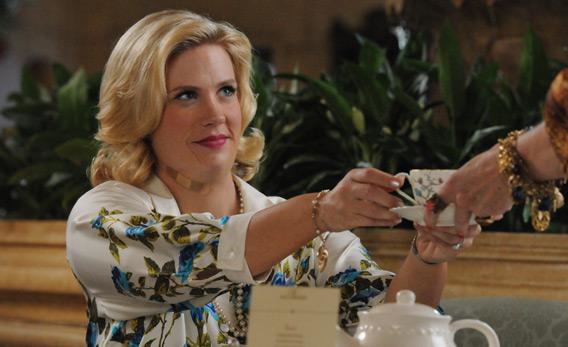Great observation about Sally, Julia. I hadn’t caught her watching Megan and Betty’s eating habits, but you’re right. Even if she doesn’t go on to develop a disorder, it’s a lovely reminder of how children study their elders for cues about how to navigate life (and how not to), even in those moments when the adults themselves feel lost.
And now that you point it out, she probably will start skipping meals. The Sopranos used to throw out red herrings: For an episode or two, Tony would be gambling, and you’d think he was about to succumb to a full-blown gambling addiction. But then he wouldn’t, and you’d wonder whether the writers had made a cunning head fake, or whether, on the contrary, it was just an idea that they entertained, then ultimately opted to scrap. Weiner is a veteran of North Jersey, of course, and Mad Men has generated a few of these false starts, where a character seems headed down some path, but ultimately avoids it. (Commenters: Can you spot them?) But these loose ends have been the exception, rather than the rule. Very little happens by accident in Weiner world. So let’s keep an eye on Sally at dinnertime.
At the risk of falling into a kind of Team Don/Team Betty discourse that feels a bit reductive for this show, I should clarify one aspect of my earlier entry. I actually do find Betty sympathetic in some respects; my point was more about the narrative choices that the Mad Men writers make. Most of the characters in the show have redeeming qualities that tend to manifest even, perhaps especially, during their worst bouts of assholism. Roger is arguably the most repellent character on Mad Men, yet line for line, he is as funny as a very funny stand-up. Don’s lies and betrayals are punctuated by moments of genius and vulnerability. Hell, Tony Soprano kills people, but he’s trying to be a good dad—this is not a new device.
The point that I was making on Sunday was that with Betty, the writers tend to deny us those redeeming, sympathetic moments. As an artistic matter, this may be unassailable; in real life, some adults really are vapid children with few redeeming qualities. But on a show where each character possesses a distinctive ratio of vinegar to sugar, Betty feels out of proportion to me. She’s almost all vinegar, and that strikes me as cruel.
Many of our readers came to Betty’s defense. JosieKatz points out that for most of her life, the metric of Betty’s worth, for herself and others, has been her beauty. Little wonder she’s demoralized by the prospect of losing that one perishable offering. January Jones does an extraordinary job of conveying this incipient panic, don’t you think? Watch her in the scene with the doctor: Each little blink and flip of the hair is a stress fracture in her otherwise composed exterior. It’s like watching an android malfunction. Several commenters were also troubled by the imposing gloom of the new Francis residence, so that may be a factor as well. Forget the cancer scare; Betty needs to grab the kids and get out of that haunted mansion.
John, I’m with Julia on Don’s impromptu backstage focus group. Isn’t the whole point with Don that while he always came off as the embodiment of the zeitgeist, in reality, he was just a devoted student of it, with a knack for imitation? Roger is content to look out the window, nursing his drink and his contempt for the hordes below, wondering, with a certain magical thinking, “When is everything going to get back to normal?” Don may not blend in with the backstage crowd, exactly, but at least he’s out there in it, trying to figure out what’s going on.
That said, I couldn’t agree more with your point about Megan and her work. I was struck by that moment, too, where she gamely feigns boredom at dinner table shop talk. But I also liked something she says to Don earlier, about the guy from Heinz: “He’s the only man I want to please more than you.” That single utterance captures the complexity of this peculiar moment for Megan, in both the office and the bedroom. (I also loved that the Heinz guy gets the song wrong, thinking it’s “Time Is on Your Side.” Megan corrects him, “Time Is on My Side,” to which he can only smile, and allow, “Yes, it is.”)
I’m delighted that neither of you has beaten me to the best-line-of-the-episode prize. My favorite? Harry Crane, trying to impress the underage Stones fans with a story about Charlton Heston (who they’ve never heard of). “We went to his house. He came out naked.” Then, “In fairness, I don’t think he knew we were there.” Then, “It was kind of an impromptu meeting.”
Hank likes vodka. Jack likes Jack.
Patrick
P.S. I have located Duck Phillips! He moved to Seattle and joined the police department.
